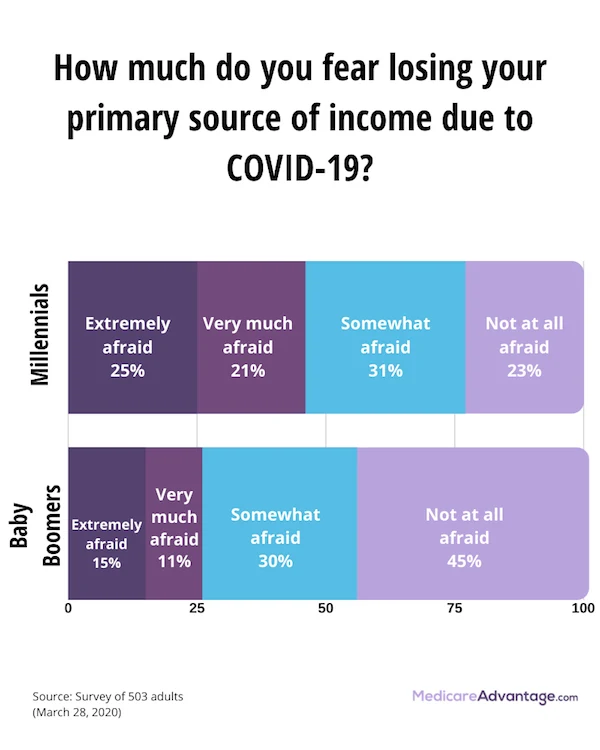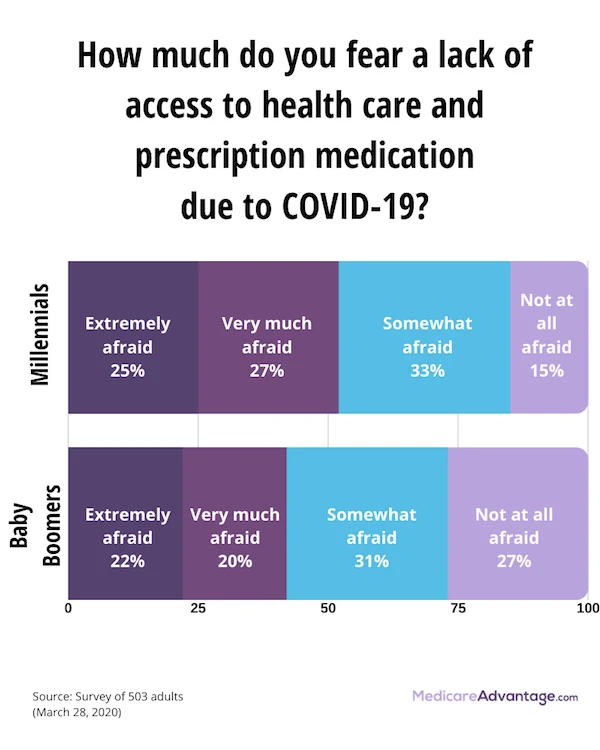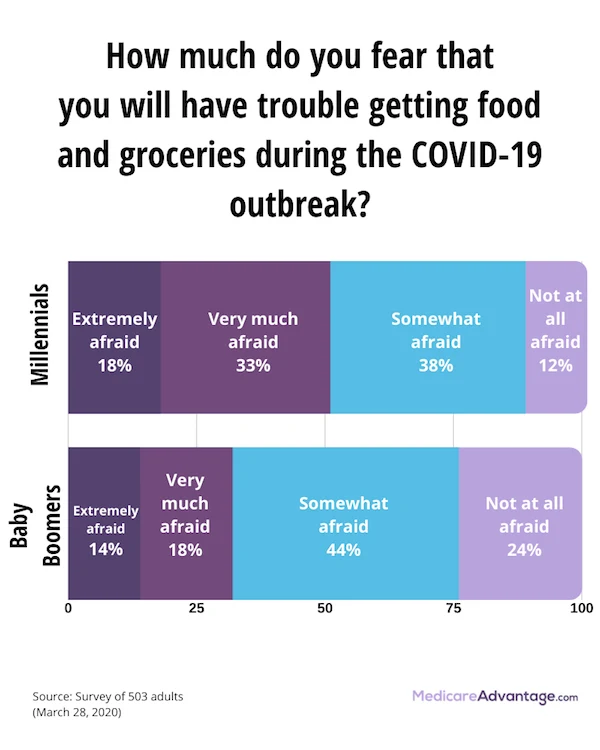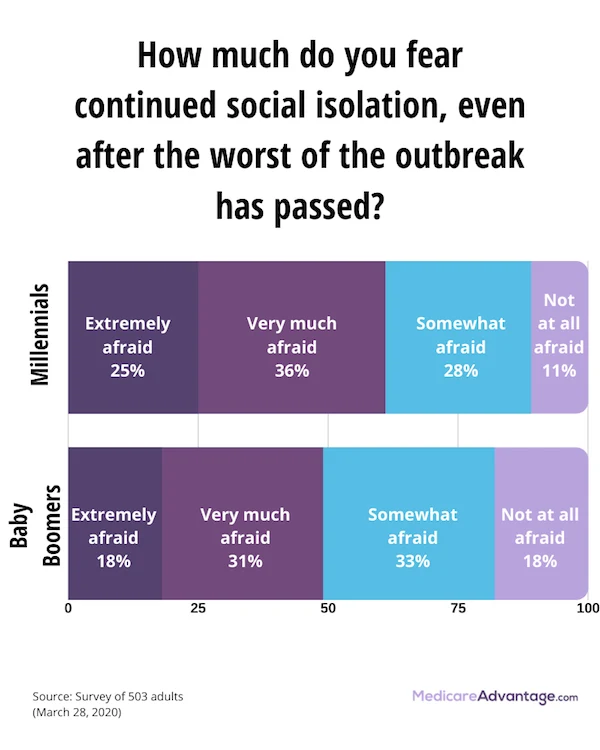Millennials Are More Acutely Afraid of COVID-19 Fallout Than Boomers
Survey Shows Millennials Have Greater Anxiety Over Coronavirus Than Older Adults
Published April 2, 2020
Are millennials actually less afraid of the global coronavirus (COVID-19) pandemic than baby boomers and other older adults? Our survey of more than 500 Americans suggests otherwise.
We polled millennials aged 24 to 39 and older adults aged 55 and up about their different fears surrounding the pandemic.
We found that millennials are much more acutely worried about the economic, social, nutritional and overall health fallout from the COVID-19 outbreak than their elders.
Those increased concerns rang true across a number of specific factors, such as the ability to obtain health care or even becoming infected with the disease itself.
Key Findings
- Nearly half of all seniors are “not at all” afraid of losing their primary source of income, compared to less than a quarter of millennials.
- 82% of millennials report being “extremely” or “very much” afraid of a lengthy economic recession due to the COVID-19 outbreak, while only 70% of seniors report the same level of fear.
- Nearly twice as many seniors say they are not afraid of limited access to health care, prescription drugs and groceries than millennials.
- 12% of millennials and 13% of seniors are “not at all” afraid of being infected with the novel coronavirus. However, more millennials are “extremely” or “very much” afraid of getting the virus (44%) than seniors (36%).

Millennials more fearful of COVID-19's economic and political impact
Among the worries about COVID-19 is the economic fallout, as millions of people have been put out of work and the stock market tumbles due to the pandemic.
According to the data, it’s millennials who are worried the most, despite typically having less money to lose than baby boomers.
- Nearly half of millennials say they are “extremely” (25%) or “very much” (21%) afraid of losing their primary source of income.
- That came in contrast to just 15% of seniors who are “extremely” worried and only 11% who report being “very much” worried about losing their main source of income.
- 83% of millennials say they are either “extremely” or “very much” afraid the country will tilt into a lengthy economic recession as a result of the pandemic, compared to 70% of seniors who report the same fear.
With Democrats and Republicans divided on the government’s response to COVID-19, many people are fearful of the political fallout during an already tumultuous time.
Millennials, however, are much more concerned about the political impacts of the novel coronavirus outbreak than their baby boomer counterparts.
60% of young adults say they are either “extremely” or “very much” afraid of the long-term negative political effects of the outbreak. Only 47% of seniors report the same level of anxiety.

Baby Boomers less concerned about infection and access to health care
One might assume older adults are more concerned about access to health care amid an outbreak that has left hospitals and doctor’s offices overcrowded and understaffed.
After all, this demographic relies on the health care system more than younger generations do, and they are at greater risk of serious infection and death from COVID-19.
However, fewer baby boomers (44%) report being “extremely” or “very much” afraid that they won’t be able to get the health care services and prescription medications they need, compared the number of millennials (52%) who report the same level of fear.
Nearly twice as many seniors (27%) as millennials (15%), in fact, report they are “not at all” afraid of lacking access to health care services.
And when it comes to anxiety over contracting the novel coronavirus, 44% of younger respondents say they are “extremely” or “very much” afraid of contracting COVID-19, which is surprisingly higher than the 36% of older adults who share the same levels of fear.

Millennials more anxious their diets will suffer, they'll lack access to groceries and their favorite restaurants will close
Some seniors already face certain challenges with obtaining food and groceries, but the COVID-19 outbreak doesn’t seem to be heightening those fears.
- In fact, only 32% of baby boomers say they are “extremely” afraid (14%) or “very much” afraid (18%) of having trouble getting food and groceries during the pandemic.
- Over half of millennials (51%), in contrast, report being “extremely” afraid (18%) or “very much” afraid (33%) of lacking access to food and groceries because of COVID-19.
When asked how much they fear their diet will suffer during an extended period of social distancing due to overeating and/or snacking on less healthy foods, 36% of millennials are “extremely afraid” or “very much afraid.”
Only 22% of baby boomers report the same levels of anxiety.
In a surprising display of similarity, both millennials and boomers reported similar levels of intense anxiety when asked how much they fear their favorite restaurant closing permanently due to the COVID-19 outbreak as they did when asked how much they fear being infected with the virus itself.
- 35% of older adults are “extremely” or “very much” afraid that their favorite restaurant will close permanently because of the outbreak, and only 36% report being "extremely" or "very much" afraid of COVID-19 infection.
- 4 in 10 young adults report high levels of anxiety about their favorite restaurant closing down, and only 44% say they are “extremely” or “very much” afraid of COVID-19 infection.

Millennials report more acute anxiety about social isolation's negative social impacts
Isolation is a threat to many seniors, and the prospect of stay-at-home or shelter-in-place orders add another dimension to this existing health concern.
- When asked how much they fear being isolated at home for a long period, even after the worst of the novel coronavirus outbreak has passed, 49% of seniors say they are either “extremely” (18%) or “very much” (31%) afraid.
- However, when asked the same question, 61% of young adults report being either “extremely” (25%) or “very much” (36%) afraid.
- Surprisingly, more baby boomers (18%) report being “not at all” worried about continued isolation, compared to just 11% of millennials.
Isolation and social distancing can place a strain on relationships with friends and family. But once again, this concern is felt more acutely by millennials.
- 32% of younger adults say they are either “extremely” (12%) or “very much” (21%) afraid that their social and/or family relationships might be negatively affected amid the isolation and social distancing measures.
- Curiously, this number is higher than the 22% of older adults who report being “extremely” (9%) or “very much” (13%) afraid of negative impacts to their family and social lives.
Conclusions
While baby boomers and other older adults are concerned about aspects of the fallout from the COVID-19 pandemic, millennials are much more acutely afraid of the outbreak and how life may change as a result.
Recent headlines have shown young adults eschewing warnings about social distancing and heading to spring break to party, but this survey suggests that perhaps the millennial generation is not to blame and is taking the pandemic very seriously.
Falling between the ages of 24 and 39, millennials are typically young adults who are still in the early to middle stages of their careers, and many millennial parents have young dependent children.
These factors, plus the economic insecurity that has plagued the millennial generation since the 2008 Great Recession, may contribute to the increased anxiety reflected in millennials' responses to our survey.
Methodology
This study was conducted March 26-28, 2020, using Cloud Research via Amazon's Mechanical Turk. The total survey side included 503 respondents.
Participants were filtered to exclude heavy users of the Mechanical Turk platform, as well as based on completion time and failure to follow written instructions within the survey.
Age distribution:
24-39: 252
55+: 251
Margin of error: +/- 4% (95% confidence interval)
This survey relies on self-reported data.
Notes
While we tried to remain as scientific as possible in our methodology, any study of health remains highly subjective. These results show an association but do not prove causality.
This article is for informational purposes only. It is not healthcare advice, treatment or diagnosis. Speak to your doctor about your healthcare needs, especially if you experience any COVID-19 infection symptoms.
Fair Use Statement
Of course we would love for you to share our work with others. We just ask that if you do, please grant us the proper citation with a link to this study so that we may be given credit for our efforts.
Research and reports
Our research reports analyze a number of issues important to seniors, from health perceptions, medical communication, health habits, and more.
